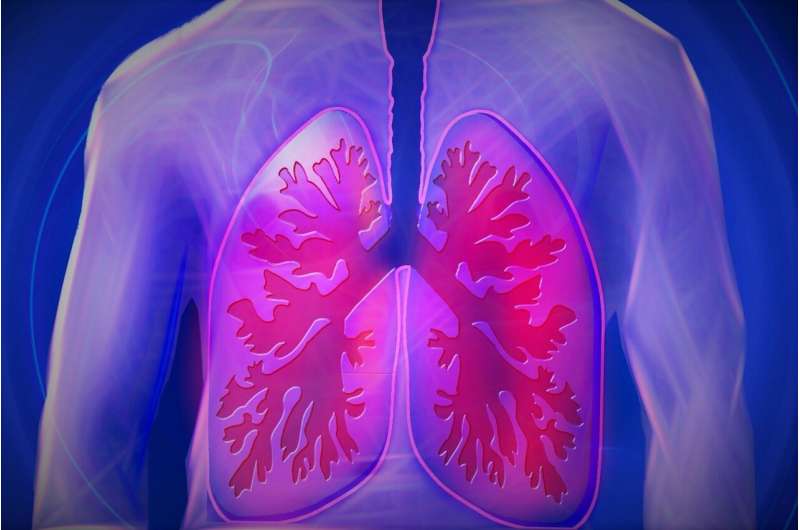This article has been reviewed according to Science X's editorial process and policies. Editors have highlighted the following attributes while ensuring the content's credibility:
fact-checked
proofread
Trial demonstrates firmonertinib is a potential therapy for patients with NSCLC with EGFR PACC mutations

The tyrosine kinase inhibitor firmonertinib showed promising efficacy in patients with non-small cell lung cancer across a broad range of EGFR PACC mutations in the first-line metastatic setting with CNS antitumor activity, according to research presented at the International Association for the Study of Lung Cancer 2024 World Conference on Lung Cancer.
Firmonertinib is an oral, highly brain-penetrant EGFR inhibitor with broad activity and selectivity across EGFR mutations. It is approved in China for first-line, advanced NSCLC with EGFR Ex19del/L858R and previously treated advanced NSCLC with EGFR T790M and has received FDA Breakthrough Therapy Designation for first-line, advanced NSCLC with EGFR ex20ins mutations.
The FURTHER trial is a global, Phase Ib study with Stage 1 (dose escalation/backfill) and Stage 2 (dose expansion). Stage 2, Cohort 4 (PACC cohort) enrolled NSCLC patients with EGFR PACC mutations randomized to one of two dose levels of firmonertinib (160 mg or 240 mg once daily).
P-loop and ⍺C-helix compressing (PACC) mutations are primarily missense mutations located in exons 18–20 and account for ∼12.5% of all EGFR mutations, which is larger than Exon 20 insertion mutations. Key eligibility criteria include documented EGFR PACC mutation, measurable disease per RECIST 1.1, and no prior EGFR TKI.
Primary endpoint confirmed overall response rate per RECIST 1.1 by BICR. Key secondary endpoints include duration of response and central nervous system overall response rate.
Dr. David Planchard, an investigator from Institut Gustave Roussy, and investigators across 10 countries enrolled 60 patients in the FURTHER trial PACC cohort. The patients had a median age of 67.0 years— 66.7% were female, 71.7% were Asian and 33.3% had brain metastases, 28.3%/71.7% ECOG 0/1, and 78.3% with no prior metastatic systemic therapy.
In first-line metastatic NSCLC patients with EGFR PACC mutations, the overall response rate by blinded independent central review was 81.8% (n=22; 95% CI, 59.7–94.8%) for those receiving the 240 mg daily dose. For patients at the 160 mg daily dose level, the overall response rate was 47.8% (n=23; 95% CI, 26.8–69.4%).
The confirmed overall response rates were 63.6% (n=22; 95% CI, 40.7–82.8%; with one unconfirmed partial response pending confirmation) at the 240 mg dose and 34.8% (n=23; 95% CI, 16.4–57.3%; with one unconfirmed partial response pending confirmation) at the 160 mg dose levels, respectively.
Responses to firmonertinib were observed across a broad range of PACC mutations, with a median duration of response not yet reached, as 90.9% (n=20 of 22) of patients with confirmed responses remain on treatment, with a median follow-up of 4.2 months.
In first-line patients with brain metastases at baseline, the confirmed central nervous system overall response was 46.2% (n=6 of 13) based on modified RECIST criteria. This result underscores firmonertinib's potential effectiveness in treating brain metastases in this patient cohort.
Firmonertinib showed promising efficacy in NSCLC patients across a broad range of EGFR PACC mutations in the first-line metastatic setting with central nervous system antitumor activity and acceptable safety.
"Based on the results from the FURTHER trial, firmonertinib merits continuing investigation for patients with NSCLC with EGFR PACC mutations," said Dr. Planchard.


















